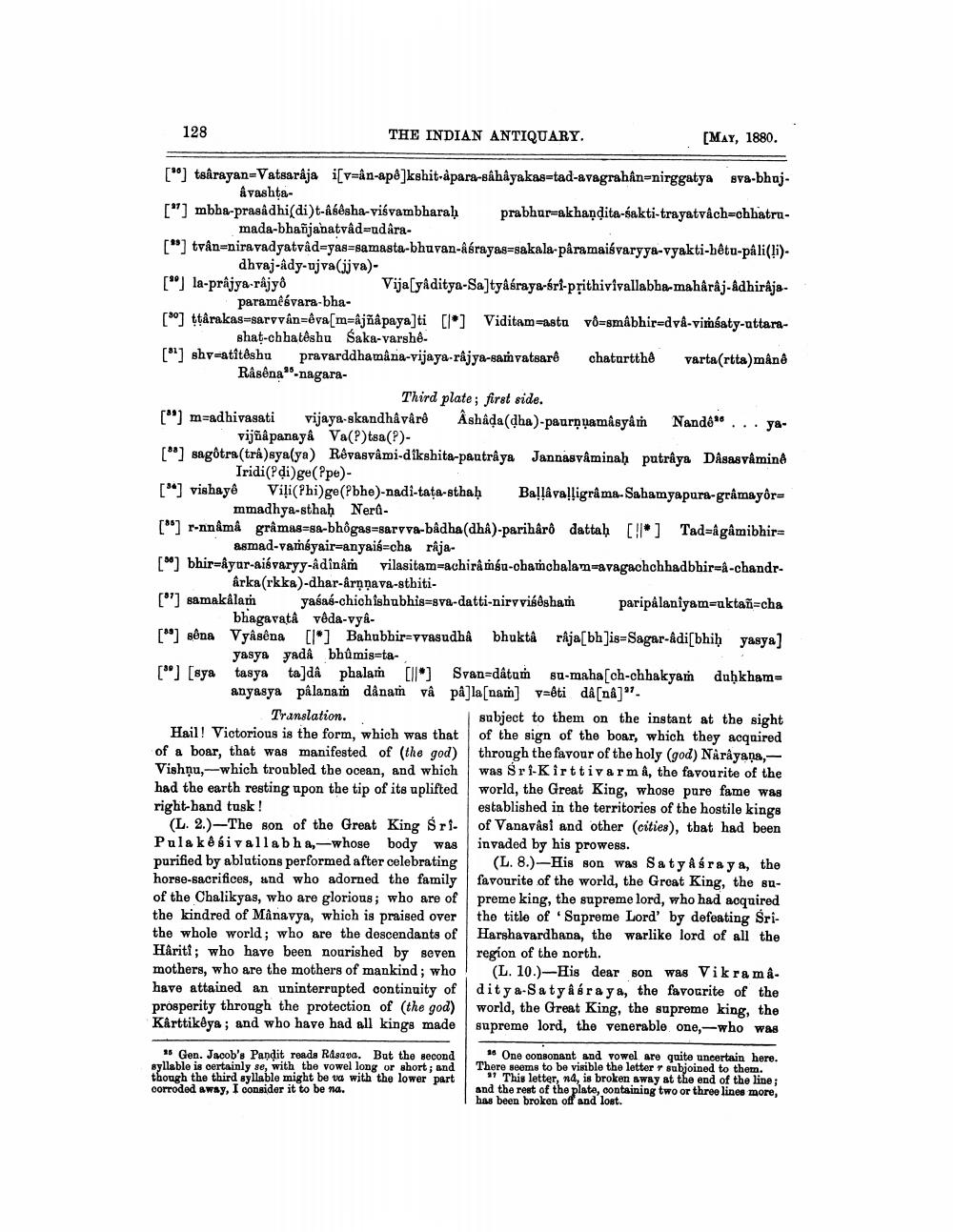________________
128
THE INDIAN ANTIQUARY
[MAY, 1880.
["] tsarayan-Vatsarâja i[v=ân-apê]kshit-para-sâhâyakas-tad-avagrahân=nirggatya sva-bhaj.
& vashta["] mbha-prasadhi(di)t-abesha-visvambharah prabhur-akhandita-sakti-trayatvách=chhatru
mada-bhañjanatvâd=udara["] tvân=niravadyatvâd=yas=samasta-bhuvan-kórayas=sakala-pâramaiśvaryya-vyakti-hêtu-pâli(li).
dhvaj-âdy-ujva(jjva). [*] la-prajya-rajyo
Vija[yâditya-Sa]tyåóraya-sri-prithivivallabha-mahârâj-adhirajaparameávara-bha[""] ttârakas=sarvvân=êva[m=ājõâpaya]ti [lo] Viditam-asta vô=småbhir-dva-vimsaty-uttara
shat-chhatêshu Saka-varshe. [*] shv-atitéshu pravarddhamâna-vijaya-rajya-saṁ vatsarê chaturtthô varta(rtta)mânê Råsêna"-nagara
Third plate; first side. {"] m-adhivasati vijaya-skandhâvârê Âshada (dha)-paurpuamasyam Nando" ... ya
vijāâpanaya Va(?)tsa(?). (**) sagðtra(trá)sya(ya) Rêvasvâmi-dikshita-pautrậya Jannasvâminaḥ putrậya Dåsas våmind
Iridi(Pdi)ge(Ppe)["] vishayê Viļi(Phi)ge(Pbhe)-nadi-tata-sthaḥ Baļļâvalligrâma. Sahamyapura-grâmayôr=
mmadhya-sthaḥ Nerd[*] r-nn&må gråmas-sa-bhôgas=sarvva-bâdha (dha)-pariharê dattaḥ [!] Tad-âgâmibhir
asmad-vamấyair-anyais-cha râja[] bhir=&yur-aišvaryy-adinâm vilasitam=achira mba-chamchalam-avagachchhadbhir-a-chandr
arka(rkka)-dhar-ârņņava-sthiti["'] samakálam yasas-chichishubhis=sva-datti-nirv visdsham paripalaniyam=uktañ=cha
bhagavat vêda-vyh[") gêna Vyâgêna [I] Bahubhir=vvasudha bhukta raja[bh]is=Sagar-adi[bhiḥ yasya]
yasya yadê bhůmig-ta["" [sya tasya tajda phala [ll] Svan=dâtum su-maha(ch-chhakyaṁ duhkham
anyasya pâlanan dånam vâ palla[nam) v=ôti då[na]". Translation.
subject to them on the instant at the sight Hail! Victorious is the form, which was that of the sign of the boar, which they acquired of a boar, that was manifested of (the god) through the favour of the holy (god) Nåråyana,Vishņu,-which troubled the ocean, and which was Sri-Kirttivarma, the favourite of the had the earth resting upon the tip of its uplifted world, the Great King, whose pure fame was right-hand tusk!
established in the territories of the hostile kings (L. 2.-The son of the Great King Sri. of Vanavasi and other cities), that had been Pula kesivallabh a-whose body was invaded by his prowess. purified by ablutions performed after celebrating (L. 8.)-His son was Saty Aśraya, the horse-sacrifices, and who adorned the family favourite of the world, the Great King, the suof the Chalikyas, who are glorious; who are of preme king, the supreme lord, who had acquired the kindred of Manavya, which is praised over the title of Supreme Lord' by defeating Srithe whole world; who are the descendants of Harshavardhana, the warlike lord of all the Hâriti; who have been nourished by seven region of the north. mothers, who are the mothers of mankind; who! (L. 10.)-His dear son was Vikramahave attained an uninterrupted continuity of ditya-Satyasraya, the favourite of the prosperity through the protection of the god) world, the Great King, the supreme king, the Karttikêya; and who have had all kings made supreme lord, the venerable one,--who was
15 Gen. Jacob's Pandit reads Rasava. But the second syllable is certainly se, with the vowel long or short; and though the third syllable might be va with the lower part corroded away, I consider it to be na.
16 One consonant and vowel are quite uncertain here. There seems to be visible the letter subjoined to them.
This letter, wd, is broken away at the end of the line and the rest of the plate, containing two or three lines more, has been broken off and lost.




